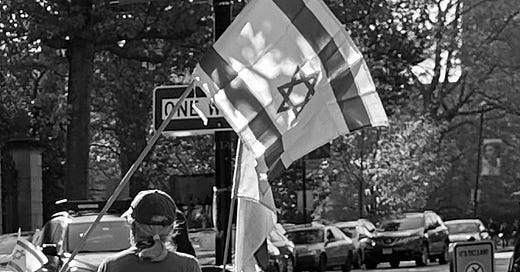The rage and sorrow was real on Oct. 7, 2023. I know I felt it in my gut, as did so many of my friends and family members. The 1,200 murdered that day (originally reported as about 1,400) after Hamas crossed into Israel proper left many of us stunned, appalled and terrified.
The collective murder triggered Jewish collective trauma and a deep-seated fear built on historical memory that includes the Holocaust but that did not start or end with it. Mourning was appropriate and I — a secular agnostic — said a Kaddish for the victims.
What has happened since — the indiscriminate murder of more than 41,000 Palestines (a likely undercount) under the guise of eliminating Hamas — has left me angry and, too often, speechless. Israel, under its hard-right government, has used this collective grief as justification for a genocidal assault on the Gaza Strip that is threatening to become a regional war.
We should not be surprised. The government of Benjamin Netanyahu is a coalition of various racist and militaristic parties, and has been pressing for this kind of conflagration for decades. It has tacitly supported the settler movement, which claims as its main tenet the creation of a Greater Israel “from the river to the sea,” and that sees itself as heir to the early Zionist terror groups that helped Israel force the British out of the region.
“From the river to the sea.” Its use by settlers should be jarring to the ears of those who argue that the phrase is unquestioningly antisemitic, that Palestinians who use it are calling for genocide. That’s how people like U.S. Rep. Elyse Stefanik, the New York MAGA Republican, want us to hear the language of pro-Palestinian protesters. What they do not want is for us to see the terrifying symmetry that has turned the Israeli government into a well-funded and powerful terror group that uses violence against civilians to control those the government sees as undesirable. Supporters of Israel will point to the threat posed by Hamas, but the Israeli government uses Hamas as a justification for its “Greater Israel” ideology and its apartheid-like division of Israeli society.
While Israel is, broadly, a democracy, it does not function fully as one when it comes to its Palestinian and Arab citizens (let alone the decades of repression in the West Bank and Gaza). According to the European Council on Foreign Relations, “Palestinians in Israel regularly complain that they are treated as ‘second-class’ citizens,” and more than 65 laws have been enacted that “discriminate directly or indirectly against Palestinian citizens in Israel and Palestinian residents” of the Occupied Territories. In addition,
Palestinian political figures frequently face efforts by Israeli authorities and Jewish parliamentarians to limit their political rights. These include motions to disqualify Arab parties from running in the election; criminal indictments by police against Arab politicians for participating in demonstrations; and a new law allowing 80 Knesset members (out of 120) to expel their colleagues from the parliament, among others.
This amounts to a version of apartheid built upon a sense of Jewish supremacy — a phrase that I know carries a lot of negative weight. Zionism is and always has been a form of Jewish nationalism, one that elevates Jews above others living within the boundaries of the state it has claimed. In this way it is no different than the Hindu nationalism of Narendra Modi or the religious nationalism of groups like the Taliban.
“Zionism,” Shaul Magid1 writes, is “a chauvinistic ideology at its core.”
It argues for a Jewish right to a land where other people dwell (what Chaim Gans calls “proprietary Zionism”). It argues for exclusive Jewish self-determination through assured majoritarianism, while at the same time promising democracy for all. It makes a historical argument that is really a cover for a theological claim.
I don’t offer this analysis lightly. I know how it will be heard by many of my fellow Jews, who still point to the liberal elements of the Jewish national project. But, as Magid writes, “the social and political realities of the Israeli state today cannot be defined as ‘liberal’ by any stretch of the imagination.”
And maybe never should have been seen as liberal because of this.
Today, the Netanyahu government is building on this illiberality with the “continued—perhaps permanent—occupation/annexation of millions of stateless Palestinians and their land,” support for illegal settlements and the settler movement, and the adoption of laws like the 2018 Nation-State Law, “which arguably codifies Jewish domination, even supremacy, into the state itself.”
Hamas certainly is no better — it is theocratic, violent, and has never fully renounced the antisemitism of its charter (it has toned it down in its more recent version). But Hamas is a product of broader currents, part of a symbiotic relationship. It exists because of the Occupation, because of the failures of Israel to act openly and fairly and to address the real needs of Palestinians in Gaza, the West Bank, and the diaspora. It exists because the Israeli government needs it as symbol.
Ethno- and religio-nationalisms are divisive by design. They survive by creating an other that can be demonized, by then placing the demon other in They share a DNA with fascist ideologies and too easily devolved into violence. Israelis and Palestinians deserve better, deserve a single, multi-ethnic nation in which everyone has the same rights and in which peace is the norm.




